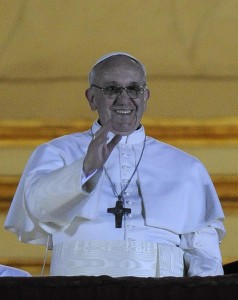New Pope Must Modernize Church Theology
March 13, 2013
When Pope Benedict XVI became the Pope Emeritus (a title indicating he had retired) on Feb. 26, the Vatican deleted the tweets from his Twitter page and consigned them to an archive on the Vatican website. The blank @Pontifex, meaning bridge builder, Twitter feed, labeled “Sede Vacante,” boasted 1,616,565 followers but zero tweets and stood as a challenge to its next user. What kind of leadership do those million-and-a-half tweeters need? What about the billion Catholics who don’t tweet? To preserve the Church, the newly elected pope, Jorge Mario Bergoglio (to be named “Francis”), will need to get back in touch with Catholics, and he will need more than 140 characters at a time.

Last month, The New York Times and CBS News polled American Catholics, asking them to speak openly about the effectiveness of the Church’s leaders and policies. The poll indicates that many Americans feel lukewarm about the Pope, Vatican leadership and their bishops. Fifty-three percent answered “Out of touch” to the question, “In general, do you think the Catholic Church is in touch with the needs of Catholics today?” To the same question, 39 percent answered “In touch” and seven percent were “Undecided.” Other parts of the survey reveal that American Catholics feel more connected with their local priests. It also revealed that most Americans think the new Pope should not favor legalized abortion (56 percent), but that he should favor condom use for STD prevention (91 percent), artificial methods of birth control (71 percent), women in the priesthood (69 percent) and marriage for priests (69 percent).
These survey results challenge some of the Church’s oldest teachings. Are such dramatic changes really what it will take to make Catholics feel at home in the Church again? My knee-jerk reaction is, “No, the Church shouldn’t change centuries of tradition just because Americans are becoming more socially liberal.” I would argue that the Church has an organizational problem, not a theological one—the Curia, the Vatican’s hierarchical system, is fraught with corruption, and changing the hierarchy would thaw the numbing gap between the Pope, the Bishops and lay Catholics. After all, if Catholics perceive their local leaders warmly, why not let those leaders make more decisions?
However, in those places where priests listen to their parishes and develop new solutions, as this week’s issue of The Economist notes, liberal policies emerge. Priests advocate for women’s ordination, marriage for priests, and perhaps most importantly, new teachings on contraception and sex. All-male priesthood, priestly celibacy and abstinence-only teachings aren’t simply outdated; they are ill founded and alienating to the Church’s own faithful followers. One population that has been blatantly alienated is women, a group who compose the majority of the Church and of those who lead consecrated lives, according to the Pew Forum and the United States Conference of Catholic Bishops. This week, CBS News released a set of interviews with women in the Church, a cantor and a nun, who, though devoted Catholics, feel that the ban on female priests hurts the Church.
As far as I know, this prohibition derives from none of Jesus’ teachings; rather, it comes from a single New Testament passage, 1 Timothy 2:12 (KJV), which reads, “But I suffer not a woman to teach, nor to usurp authority over the man, but to be in silence.” Christ himself, however, accepted women in a social context that shunned them. In my view, he chose Peter as the first Pope not because he was male, but because he had the characteristics of a faithful and charismatic leader. Today, if women feel called to the priesthood, the Church should at least take that feeling seriously.
Another problem that needs to be fixed is the Church’s tradition of sexual deprivation. As Comedian Stephen Fry claimed in 2009, the Church, like an anorexic obsessed with food, is “obsessed with sex, absolutely obsessed.” Why are priests celibate when they shouldn’t have to be? Consider that this tradition doesn’t come from Christ, either. In 1 Corinthians 7:25 (KJV), Paul writes, “Now concerning virgins I have no commandment of the Lord: yet I give my judgment.” He goes on to write that those who were celibate should remain so because “the time is short.” In other words, Paul thought Judgment Day would come in his lifetime, so he encouraged the people of Corinth to remain in whatever state they were—after all, it wouldn’t matter soon. That statement doesn’t necessarily demand that people who feel drawn to the word of God must give up the sacrament of marriage, and it shouldn’t be twisted to be interpreted that way.
If nothing else, Pope Francis must revise the Church’s stance on contraception. Abstinence-only education simply does not work; it does not fit the reality of human existence, and lay American Catholics seem to essentially ignore the moral teaching. An extensive Guttmacher survey reports that 68 percent of sexually active, fertile Catholic women who do not want to become pregnant use a “highly effective” method of birth control (hormonal medication, sterilization or IUD) while 16 percent use condoms and the five percent “withdrawal” method—all methods condemned by the Church. When their parents disobey the Church’s teachings, how can we expect teenagers to follow them? The Church’s demands for patriarchy, abstinence and no contraception don’t match the people’s needs, and if they cannot change, they will drive believers away for good.









